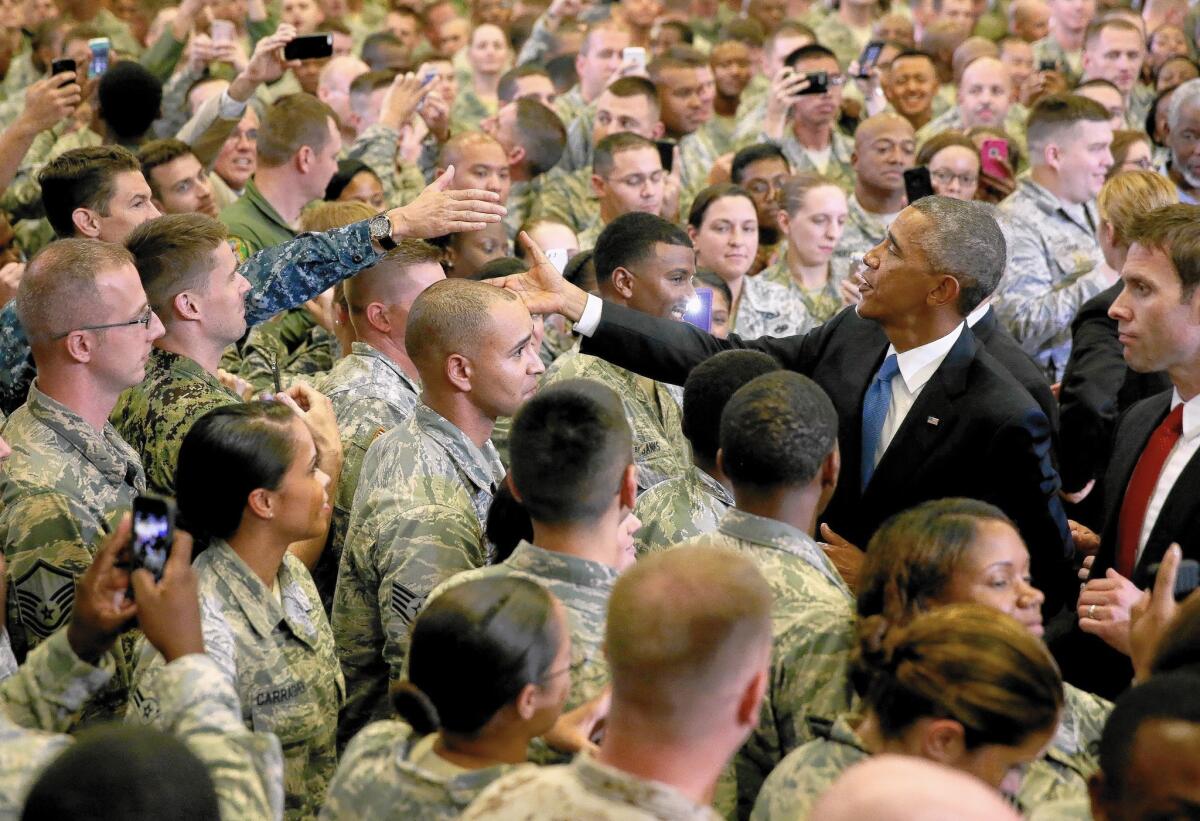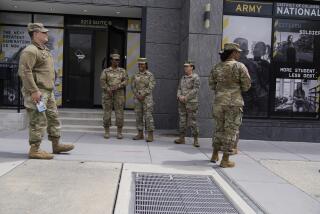Caveats to Obama’s rule against ‘combat mission’ in Iraq, Syria

A day after his top military advisor opened the door to putting U.S. combat troops on the ground in Iraq and Syria, President Obama appeared to slam it shut again Wednesday, declaring that American troops “do not and will not have a combat mission.”
The president’s blunt pledge — and the revelation that the Pentagon doesn’t share that commitment — was a reminder that the vow is not as simple as Obama’s statements imply.
Disagreements abound in Washington over whether Obama can achieve his goal of “degrading and ultimately destroying” Islamic State militants in Iraq and Syria without the use of ground forces. And although Obama says he has made up his mind on the matter, the president also has scripted his promises carefully, leaving himself room to adjust to circumstances and the inevitable unforeseen outcomes of war.
“As your commander in chief, I will not commit you … to fighting another ground war in Iraq,” he told troops during a visit to U.S. Central Command headquarters here. “After a decade of massive ground deployments, it is more effective to use our unique capability in support of partners on the ground so they can secure their own countries’ futures.”
Such assurances are aimed at an American public outraged by the rise of Islamic extremists and the beheadings of two American journalists, but still bruised by memories of the Iraq war. Obama’s language has allowed him to promise bold action without a big footprint, an assertion more complicated than it appears.
White House officials dispute any ambiguity about Obama’s position, but they also caution reporters to be “precise” about Obama’s hard line. The president has ruled out deploying U.S. ground troops against Islamic State militants in Iraq and Syria, they say.
There are obvious categories of U.S. engagement not covered in that promise. Pilots, for example, are engaged in combat in Iraq, but they are not ground forces.
And Obama’s pledge has not prevented him from ordering about 1,600 military personnel into Iraq, a number the White House has not ruled out the possibility of increasing. Those troops are engaged in advising and training, not combat, officials say.
Obama also has specified that U.S. combat troops would not be deployed to “fight” or have a “combat mission,” a distinction that allows for the possibility that U.S. special forces might be used in a rescue mission, as was the case this summer in the failed attempt to retrieve U.S. hostages being held by Islamic State militants in Syria.
In testimony before a Senate panel Tuesday, Gen. Martin Dempsey, the chairman of the Joint Chiefs of Staff, was more explicit about these exceptions and more open about others that might arise. The general, known for his candor and political independence, mentioned the possibility of a rescue, but went further, imagining a scenario in which he would recommend that U.S. troops assist Iraqi forces in combat.
“If we reach the point where I believe our advisors should accompany Iraqi troops on attacks against specific ISIL targets, I’ll recommend that to the president,” Dempsey said, using an alternative abbreviation for the extremist group.
The comment reflects a concern shared by some military officials about an overemphasis on air war to root out the Sunni extremists who have seized control of both desert areas and major urban hubs in Iraq and Syria.
Later, Dempsey told reporters that the militants had already begun to adjust their tactics in response to U.S. airstrikes in Iraq.
The group has begun dispersing into urban areas and increasingly adopted terrorist tactics such as suicide bombings, he said.
“What we’ve seen so far is a lot of the black flags have come down, a lot of the convoys have dispersed, a lot of the assembly areas have been moved into urban areas,” he said. “We’ve seen an increase in the number of improvised explosive devices and suicide attacks.”
As hundreds of additional U.S. troops move in to advise and train Iraqi forces, the Pentagon is planning to widen the types of targets it hits from the air, focusing on Islamic State leaders, he said.
“I think you’ll see the aperture open a little bit … whether it’s fixed facilities, whether it’s high-value individuals,” Dempsey said. “That is the next step.”
The ramp-up of U.S. airstrikes was evident when the military announced Wednesday that it had hit a variety of militant strongholds across Iraq. The seven strikes were the most since Obama outlined his strategy to the public last week.
But few, including the president, think air power alone will eliminate the group, as Obama has said is his goal.
Speaking to reporters at a conference in Germany, Gen. Ray Odierno, the Army chief of staff, made that point Wednesday, adding that it was crucial to have “capable” ground troops.
The White House says it does not disagree with this assessment. Although the first phase of Obama’s strategy has included a barrage of bombings to weaken Islamic State militants, the White House has said it believes ground forces will eventually be needed to eliminate the group. Obama, however, has insisted that job be undertaken solely by proxy forces: Kurdish peshmerga, the Iraqi army and Sunni tribes in Iraq and the semiautonomous Kurdistan region, and yet-to-be-trained and armed moderate rebel fighters in Syria.
At the moment, roughly half the Iraqi army is considered reliable. A Pentagon assessment ordered last month concluded that the advisory troops can work with only 26 out of Iraq’s 50 combat brigades, Dempsey said. The remainder are considered too sectarian, Dempsey said.
“The president has been clear about the need to take the fight to ISIL on the ground in Iraq and Syria,” White House Press Secretary Josh Earnest said Wednesday. “What the president has ruled out are American service men and women being in a position where they are the ones responsible for waging combat operations on the ground in Iraq and Syria.”
Whether Obama holds to that promise is another matter, said Jon Alterman, director of the Middle East program at the Center for Strategic and International Studies, a Washington think tank. “The president always has the options to do something new,” he said. “It’s easy to imagine any number of circumstances where the president would say, ‘The conditions have changed and so have my parameters.’”
Parsons reported from Tampa and Hennessey from Washington. Times staff writer David S. Cloud aboard a U.S. military aircraft contributed to this report.
More to Read
Start your day right
Sign up for Essential California for news, features and recommendations from the L.A. Times and beyond in your inbox six days a week.
You may occasionally receive promotional content from the Los Angeles Times.








